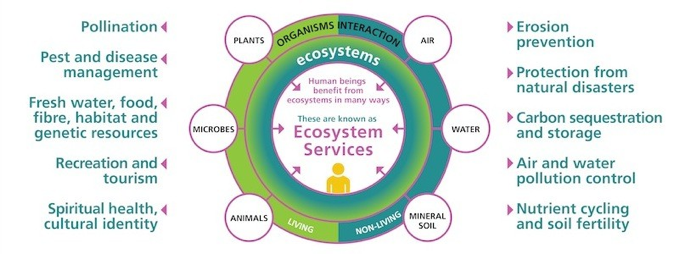‘Ebenezer Howard (1850-1928) is known for his publication Garden Cities of To-morrow (1898), the description of a utopian city in which man [sic] lives harmoniously together with the rest of nature and with one another through urban design and co-ownership of land. The publication led to the founding of the Garden city movement, that realized several Garden Cities in Great Britain at the beginning of the Twentieth Century’ (Planetizen, 2019).
In alphabetical order
E
Ecological democracy
E
Ecological footprint
E
Ecological revitalization
E
Ecology
E
(Economic) base multiplier
‘Ratio of the total number of jobs created to the number of basic jobs created. A higher economic base multiplier implies a larger effect of the basic job creator on the total number of jobs’ (Business Dictionary).
E
Economic growth
‘Economic growth is an increase in the production of economic goods and services, compared from one period of time to another. It can be measured in nominal or real (adjusted for inflation) terms. Traditionally, aggregate economic growth is measured in terms of gross national product (GNP) or gross domestic product (GDP), although alternative metrics are sometimes used’ (Investopedia, 2019a).
E
Economic space
E
Ecosystem services

E
Edge cities
The recent suburban development that emphasises producing office and retail space. (O'Sullivan, 2012, p.166-167)
E
Envisioning
‘The notion of creating images of the future to serve as goals or guides for planning decisions’ (Shipley, 2002) and ‘a clear guidance that sets the context for development based upon a clear vision of the future’ (Roberts, 1996, cited in Shipley, 2002).
E
Excess commuting
‘Excess commuting is the additional journey‐to‐work travel represented by the difference between the actual average commute and the smallest possible average commute, given the spatial configuration of workplace and residential sites.’ (Ma & Banister, 2006, p.749)
E
Exchange value
Reference List
British Ecological Society. (n.d.). ‘What is ecology?’. Retrieved from https://www.britishecologicalsociety.org/about/what-is-ecology/
Business Dictionary. Economic Base Multiplier. Retrieved from http://www.businessdictionary.com/definition/economic-base-multiplier.html
Environmental Protection Agency, the United States. (2009). Executive Summary. Ecological Revitalization: Turning Contaminated Properties into Community Assets. ES-1-ES-2. Retrieved from https://www.epa.gov/sites/production/files/2015-04/documents/ecological_revitalization_turning_contaminated_properties_into_community_assets.pdf
Friedmann, J. (2002). Life Space and Economic Space: Third World Planning in Perspective [Book cover]. Transaction Publishers, USA.
Holden, E. (2012). Ecological Footprint. In International Encyclopedia of Housing and Home, 6-11. Retrieved from https://doi.org/10.1016/B978-0-08-047163-1.00581-6
Investopedia. (2019a). Economic Growth. Retrieved from https://www.investopedia.com/terms/e/economicgrowth.asp
Ma, K.R. & Banister, D. (2006). Excess Commuting: A Critical Review. Transport Reviews, 26:6, p.749-767.
Mitchell, R. (2006). Green politics or environmental blues? Analyzing ecological democracy. Public Understanding of Science, 15(4), 459-480. Retrieved from http://lib.icimod.org/record/12332/files/732.pdf
O’Sullivan, A. (2012). Urban economics (8th ed.). New York, NY: McGraw-Hill/Irwin.
Planetizen. (2019). Ebenezer Howard. Retrieved from https://www.planetizen.com/topthinkers/howard
Research Program on Water, Land and Ecosystems, CGIAR. (2014). ‘What are ecosystem services?’. Ecosystem services and resilience framework. Colombo, Sri Lanka: International Water Management Institute (IWMI). Retrieved from https://wle.cgiar.org/content/what-are-ecosystem-services
Roberts, P (1996). European Spatial Planning and the Environment: Planning for Sustainable Development. Environmental Policy and Governance, 6(3), pp. 77-84.
Rodgers, S. (2009). Urban Growth Machine. International Encyclopedia of Human Geography, p.40-45.
Shipley, R. (2002). Visioning in Planning: Is the Practice Based on Sound Theory? Environment and Planning A, 34(1), pp.7-22.